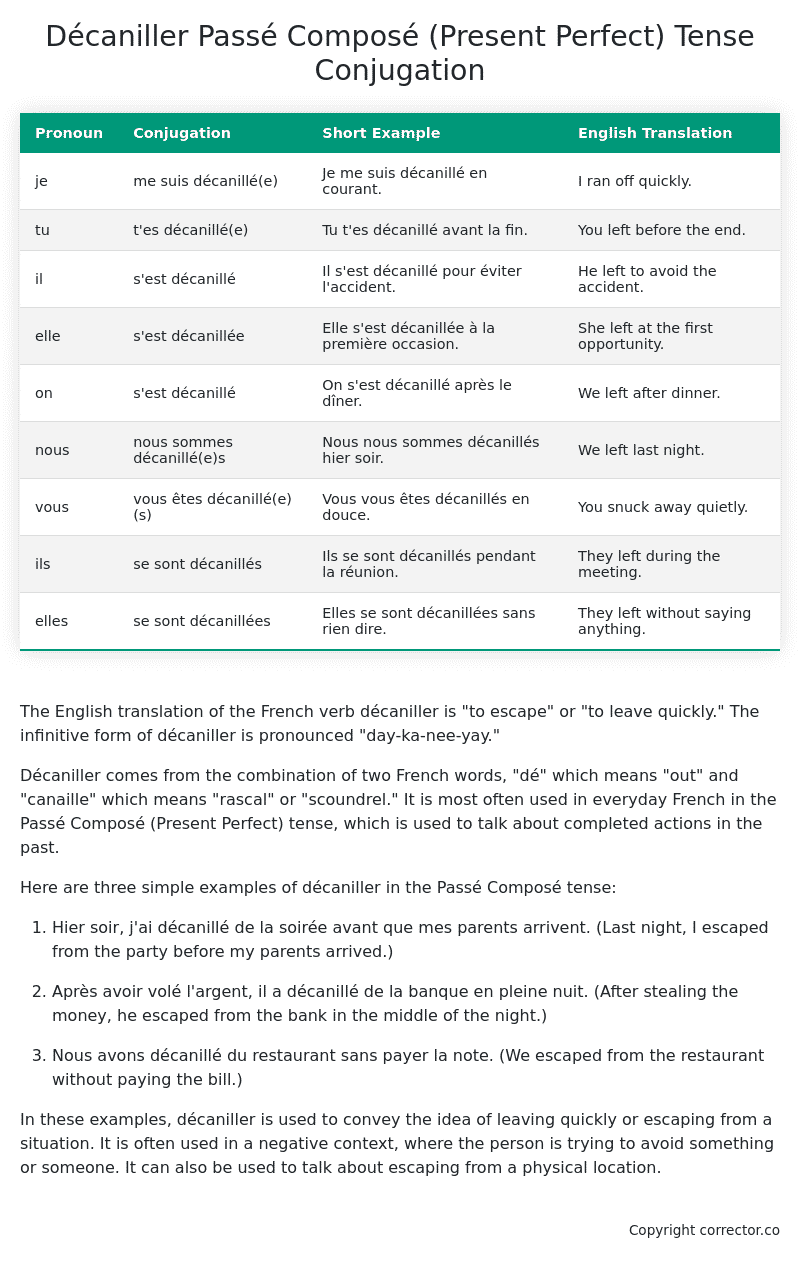Passé Composé (Present Perfect) Tense Conjugation of the French Verb décaniller
Introduction to the verb décaniller
The English translation of the French verb décaniller is “to escape” or “to leave quickly.” The infinitive form of décaniller is pronounced “day-ka-nee-yay.”
Décaniller comes from the combination of two French words, “dé” which means “out” and “canaille” which means “rascal” or “scoundrel.” It is most often used in everyday French in the Passé Composé (Present Perfect) tense, which is used to talk about completed actions in the past.
Here are three simple examples of décaniller in the Passé Composé tense:
-
Hier soir, j’ai décanillé de la soirée avant que mes parents arrivent. (Last night, I escaped from the party before my parents arrived.)
-
Après avoir volé l’argent, il a décanillé de la banque en pleine nuit. (After stealing the money, he escaped from the bank in the middle of the night.)
-
Nous avons décanillé du restaurant sans payer la note. (We escaped from the restaurant without paying the bill.)
In these examples, décaniller is used to convey the idea of leaving quickly or escaping from a situation. It is often used in a negative context, where the person is trying to avoid something or someone. It can also be used to talk about escaping from a physical location.
Table of the Passé Composé (Present Perfect) Tense Conjugation of décaniller
| Pronoun | Conjugation | Short Example | English Translation |
|---|---|---|---|
| je | me suis décanillé(e) | Je me suis décanillé en courant. | I ran off quickly. |
| tu | t’es décanillé(e) | Tu t’es décanillé avant la fin. | You left before the end. |
| il | s’est décanillé | Il s’est décanillé pour éviter l’accident. | He left to avoid the accident. |
| elle | s’est décanillée | Elle s’est décanillée à la première occasion. | She left at the first opportunity. |
| on | s’est décanillé | On s’est décanillé après le dîner. | We left after dinner. |
| nous | nous sommes décanillé(e)s | Nous nous sommes décanillés hier soir. | We left last night. |
| vous | vous êtes décanillé(e)(s) | Vous vous êtes décanillés en douce. | You snuck away quietly. |
| ils | se sont décanillés | Ils se sont décanillés pendant la réunion. | They left during the meeting. |
| elles | se sont décanillées | Elles se sont décanillées sans rien dire. | They left without saying anything. |
Other Conjugations for Décaniller.
Le Present (Present Tense) Conjugation of the French Verb décaniller
Imparfait (Imperfect) Tense Conjugation of the French Verb décaniller
Passé Simple (Simple Past) Tense Conjugation of the French Verb décaniller
Passé Composé (Present Perfect) Tense Conjugation of the French Verb décaniller (this article)
Futur Simple (Simple Future) Tense Conjugation of the French Verb décaniller
Futur Proche (Near Future) Tense Conjugation of the French Verb décaniller
Plus-que-parfait (Pluperfect) Tense Conjugation of the French Verb décaniller
Passé Antérieur (Past Anterior) Tense Conjugation of the French Verb décaniller
Futur Antérieur (Future Anterior) Tense Conjugation of the French Verb décaniller
Subjonctif Présent (Subjunctive Present) Tense Conjugation of the French Verb décaniller
Subjonctif Passé (Subjunctive Past) Tense Conjugation of the French Verb décaniller
Subjonctif Imparfait (Subjunctive Imperfect) Tense Conjugation of the French Verb décaniller
Subjonctif Plus-que-parfait (Subjunctive Pluperfect) Tense Conjugation of the French Verb décaniller
Conditionnel Présent (Conditional Present) Tense Conjugation of the French Verb décaniller
Conditionnel Passé (Conditional Past) Tense Conjugation of the French Verb décaniller
L’impératif Présent (Imperative Present) Tense Conjugation of the French Verb décaniller
L’infinitif Présent (Infinitive Present) Tense Conjugation of the French Verb décaniller
Struggling with French verbs or the language in general? Why not use our free French Grammar Checker – no registration required!
Get a FREE Download Study Sheet of this Conjugation 🔥
Simply right click the image below, click “save image” and get your free reference for the décaniller present perfect tense conjugation!

Décaniller – About the French Passé Composé (Present Perfect) Tense
Formation of the Passé Composé
Set the auxiliary verb with either
Conjugate the auxiliary verb
Add the past participle
Common everyday usage patterns
Narrating Past Events
Sequential Actions
Describing Completed Actions
Interactions with other tenses
Imperfect Tense
Conditional and Future Tenses
Summary
I hope you enjoyed this article on the verb décaniller. Still in a learning mood? Check out another TOTALLY random French verb conjugation!


